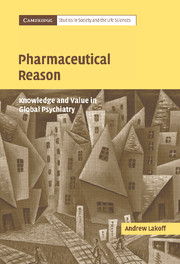3 - The Lacan ward
Published online by Cambridge University Press: 22 September 2009
Summary
Soon after I arrived in Buenos Aires in 1998, the physicist and science warrior Alan Sokal came to the city to promote his new book, Intellectual Imposters, and delivered a lecture to a large audience at the University of Buenos Aires. As expected, Sokal decried the influence of postmodern cultural relativism and anti-scientific thinking on progressive political thought. Moreover, he said, while this was merely an academic debate in the United States, in Buenos Aires, where Lacanian psychoanalysis dominated the mental health sector, it was a problem of public health. There were loud cheers from the audience.
Sokal's accusation was echoed by several of the doctors in the men's ward at Hospital Romero. Patients were often misdiagnosed and given the wrong medications, these doctors complained. More generally, they argued, an anti-scientific ethos presided among analytically oriented mental health professionals, such that it was impossible to adequately measure and efficiently approach the city's mental health needs. The problem was especially acute given the effects of structural adjustment policies and economic crisis on the public sector. They pointed across the entry corridor to the women's ward – the “Lacan ward” – as an exemplary site for such malpractice. Such criticism suggested a possible disjuncture between the resolutely pragmatic needs of the public hospital and the ethereal realm in which Buenos Aires lacanismo traveled. While following the collection of bipolar samples for the genetic study in the men's ward, I became curious about this institutionalized practice of Lacanianism across the entryway.
- Type
- Chapter
- Information
- Pharmaceutical ReasonKnowledge and Value in Global Psychiatry, pp. 73 - 102Publisher: Cambridge University PressPrint publication year: 2006

